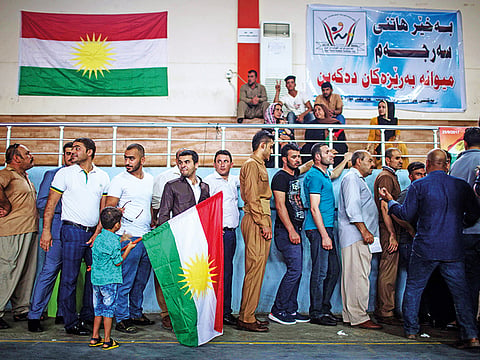Iraqi Kurds cast votes in historic independence referendum
A ‘yes’ for independence will send ripples across iraq and beyond; may spark another Middle East conflict

Arbil, Iraq: Iraqi Kurds went to the polls yesterday for a referendum on independence, ignoring dire warnings from neighbours fearful that the vote will bolster the cause of Kurdish nationalism across the region.
Turkish President Recep Tayyip Erdogan delivered his gravest threat to date after balloting began, hinting at a shutdown of oil exports that the semi-autonomous Kurdistan Regional Government (KRG) relies on for revenue. Turkey also announced joint military exercises with Iraq, while Iran called the vote “illegal and illegitimate”, and said it had closed its borders with the Kurdish region at the request of Iraq’s government.
An Iraqi Kurdish woman wearing the Kurdish flag on her face flashes the victory gesture amid celebrations in the city of Kirkuk in northern Iraq, on September 25, 2017 as Iraqi Kurds vote in a referendum on independence. Photo: AFP
“Let’s see where the regional government of northern Iraq will flow its crude oil, through which channels and where it sells it from now on,” Erdogan said in Istanbul. The President also hinted at cross-border military operations: “We may arrive one night, suddenly.”
The ballot was taking place in three provinces ruled by the KRG in northern Iraq as well as in disputed areas around the oil hub of Kirkuk. It asked one question — “Do you want the Kurdistan region and the Kurdistani areas outside the region’s administration to become an independent state?” — and their answer is almost certain to be “yes”. Voting ended at 6pm local time.
ALSO READ:
Cause and effect
Although that outcome wouldn’t automatically trigger secession or even immediate demands for it, the repercussions would be felt far beyond Iraq and have the potential to open up yet another Middle East conflict. More than 30 million Kurds are dispersed across the borders with Syria, Iran and Turkey, which face secessionist movements among their Kurdish own minorities.
“We lived for this day,” Majda Mohammad Ali, a 60-year-old civil engineer, said as she left a polling station in Arbil, which was covered with flags and banners on a public holiday for the vote. “We don’t want our children to suffer the injustice that we did.”
In Pictures: Kurds cast vote for independence
The Iraqi Kurds’ President, Massoud Barzani, told a press conference on Sunday that the Kurds’ partnership with Iraq had failed. He called for calm and said he was ready for “very long” talks with the government in Baghdad, possibly lasting years, on issues from borders to oil exports and water once votes have been counted.
Iraq has declared the vote unconstitutional.
“The risk of confrontation is big, and nobody will benefit from a new round of war,” said Kawa Hassan, director of the Middle East and North Africa programme at the EastWest Institute in Brussels. It would have been better for the Kurds to enter into negotiations with Baghdad, as proposed by the US and the United Nations, than to hold the vote, he said.
More than 98 per cent of Iraqi Kurds voted for independence in a 2005 referendum, although it was arranged by activists without official approval and did not result in statehood.
Some analysts have suggested Barzani is more interested in forcing the Iraqi government to resolve long-standing arguments over territory and oil revenue than pursuing a complete split.
Opposing viewpoint
Kurdish businessman Shaswar Abdulwahid Qadir, who has led a “Not for Now” campaign against the referendum, says the vote is being held to distract from domestic problems, including dire economic conditions caused by the plunge in crude oil prices and an influx of refugees fleeing Daesh.
Iraqi Prime Minister Haider Al Abadi made the same arguments in a televised speech Sunday. Kurdistan’s troubles are a result of corruption and mismanagement, and the referendum will only exacerbate them, he said, adding his government would take steps to protect Iraqi unity.
Reactions
- Iraq’s Parliament orders closing all border crossings with the Kurdish region. It also calls for legal measures against all Kurdish officials and employees who took part in the vote.
- Turkish President Recep Tayyip Erdogan threatens military intervention. Kurdish independence, he said, was unacceptable and that this is a “matter of survival.” He pointed to Turkish military exercises currently taking place on Turkey’s border with the Iraqi Kurdish region. “Our military is not at the border for nothing. We could arrive suddenly one night,” he said. Turkey would take political, economic as well as military measures against the vote and could halt oil flows from a pipeline from northern Iraq. Erdogan said a border crossing with Iraq had been closed in one direction and that Turkey would shut it entirely.
- Turkish Prime Minister Binali Yildirim said Turkey is also considering closing down its airspace. Officers and experts from Iraq’s army would join military exercises that Turkey launched along the border with Iraqi Kurdistan, he added. Ankara will “enter a strong” dialogue with Baghdad, he said, saying he regarded the central government in the Iraqi capital as the legitimate authority over border crossings, airports and oil trade in the Kurdish region.He says Turkey had received a formal request from Baghdad requesting the closure of the airspace and border crossing.
- Iran’s foreign ministry spokesman Bahram Ghasemi called the vote “untimely and wrong”. Iran’s powerful Revolutionary Guard has been conducting a military exercise in its northwestern Kurdish region bordering Iraq in opposition to the vote.
- Syria’s foreign minister Walid Al Mua’alem described the Iraqi Kurdish vote as a “step that we do not recognise” and stressed that the government in Damascus only recognises a “sole, united Iraq.



